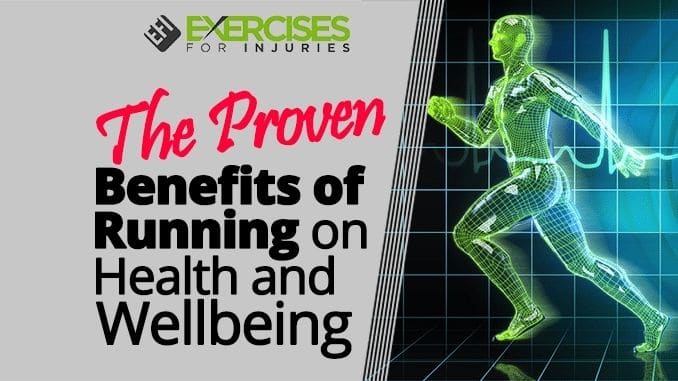
Everybody knows that exercise helps you stay healthy. Still, the proven benefits of running on health go far beyond just getting in shape. Aerobic exercise, like running, can improve your health from head to toe. Running offers benefits such as improved brain function, enhanced fertility, protection against cancer, and stronger bones.
In this article, we’ll explore the details of the proven benefits of running. We’ll start at the top of the body and work our way down.

Benefits of Running on the Brain and Mental Health
Every organ in your body loves a healthy supply of blood. Your brain depends on good circulation to function properly. Regular cardiovascular exercise like running, helps reduce blood pressure, blood sugar and cholesterol which all can increase stroke risk. In fact, studies show that people who don’t exercise have a 20 percent increased chance of stroke.
Running can also improve your memory, learning and ability to concentrate. Exercise helps reduce inflammation, improves insulin response and stimulates growth factors. All of these things help your brain work at its best. These biochemical changes may even help prevent dementia and Alzheimer’s disease.
Another way in which running helps improve brain function is by benefitting your mood and sleeping habits. Exercise is well known to help prevent or treat depression and anxiety. One explanation is that physical activity increases the blood flow to key areas of the brain associated with emotions.
Exercise, such as running, improves the circulation to these important parts of your brain:
- Limbic system: Controls motivation and mood
- Amygdala: Controls the fear response to stress
- Hippocampus: Involved in memory, mood and motivation
Benefits of Running on Your Skin
Not everybody realizes that your skin is considered a body organ. Human skin has many important functions, just like any other body system. Running helps this system work effectively and efficiently.
Improved blood flow to the skin clears away toxins and debris. This allows the skin to remain supple and remain free of skin infections. Also, because exercise can reduce emotional stress, it may help decrease the appearance of acne and eczema.
Benefits of Running on Your Blood and Circulatory System
The way running affects your blood occurs on many levels. For instance, routine exercise can lower blood sugar and cholesterol levels. This helps protect you from diabetes, heart attack and stroke.
Vigorous exercise, such as endurance training, has even more profound effects on your blood. For instance, some studies show that strenuous cardiovascular training increases your overall red blood cell mass. This means each cell can carry more oxygen, which improves stamina and muscle function. One interesting observation is that highly trained athletes might have a slightly lower red blood cell count compared to normal. This “anemia,” however, is compensated by the increased red cell mass.
Another fascinating way running affects your blood is that it kills off old red blood cells to stimulate new cell generation. Old cells rupture when they pass through the tiny capillaries of working muscle. Also, your feet pounding the pavement busts old cells. This is actually a good thing as it stimulates the production of younger cells which are more efficient at carrying oxygen. Young red blood cells are also suppler so that they flow through your circulatory system easier.
Benefits of Running on Your Heart
The heart is the center of your circulatory system, so it deserves special mention. When you make running part of your life, your heart gets stronger. Like all muscles that get exercise, the heart muscle grows. This means it can pump more blood per heartbeat, so the heart doesn’t have to beat as fast. Plus, a strong pump makes it easier for blood to reach every single organ in your body. Finally, the arteries that supply your heart with blood stay cleaner, which means less chance of heart attack.
Benefits of Running on Your Immune System
Aerobic exercise, like running, allows for improved overall circulation. This means that white blood cells and antibodies can move around better to prevent infections. Also, these germ fighters appear to work better in people that get regular exercise. Plus, the stress reduction caused by exercise helps keep your immune system stronger. There are even some theories that suggest the higher body temperature generated during exercise may make it more difficult for bacteria to grow.
Benefits of Running on Your Muscles
Your muscles require plenty of oxygen and nutrients to function properly. Exercise helps this happen in more ways than just impacting red blood cell turnover.
When you work out, special biochemicals ― called growth factors ― are released into your bloodstream. The most well-known growth factor is called vascular endothelial growth factor (VEGF). This substance stimulates the growth of new blood vessels. It’s like building a bunch of new highways to transport important materials. In your muscles, exercise leads to a process where more blood cells can deliver nutrition and remove waste faster. This means your muscles become stronger and more resistant to fatigue.
Benefits of Running on Your Lungs
Exercise benefits your lungs first of all by strengthening the muscles of respiration. The muscles between your ribs (intercostal muscles) and your diaphragm work to expand your chest cavity to bring in air. This all works more effectively when these muscles are well-conditioned.
Aerobic exercise also helps increase your lung diffusion rate. Diffusion occurs in the tiny O2/CO2 exchange lung sacs called alveoli. When the diffusion rate increases, this means a greater input of healthy O2 while the CO2 waste is removed faster.
Proven benefits of running on health are extensive, benefiting various aspects of your body and overall well-being.
Benefits of Running on Your Pancreas
Like all organs, running improves the blood flow to your pancreas, which allows it to work better. This results in a more effective production of insulin for blood sugar control. The proven benefits of running on health include its role as the main way exercise helps prevent and treat diabetes.
Benefits of Running on Your Sexual Function
Running helps your sex life in more ways than one, contributing to the proven benefits of running on health. For starters, regular physical activity may prevent erectile dysfunction in men. Running may also enhance arousal in women.
The impact of exercise on fertility may be indirect in some cases. For instance, some findings show that overweight females tend to have higher blood sugar levels. This stimulates increased insulin secretion from the pancreas, which leads to higher ovarian testosterone production. The result is irregular menstruation. Thus, keeping weight down with running may improve fertility.
On the male side of the equation, it’s been shown that regular exercise like running can increase the sperm count.
Benefits of Running on Your Skeletal System
One of the best ways to prevent osteoporosis or “thinning of the bones” is to participate in weight-bearing exercise, and running is an excellent example of this type of activity. Still, very long-distance endurance athletes should be careful not to seek a very low body weight. In this pursuit of performance, bone density might decline. It’s also important to supplement running with other types of weight-bearing exercises like weightlifting. This helps you maintain spine, hip, and arm bone strength, adding to the proven benefits of running on health.
Other Benefits to Running
Here are some miscellaneous health benefits to pounding the pavement:
- Improved energy: Like all cardiovascular exercise, running gives you more energy. This occurs not just because you are more fit, but also due to chemicals such as endorphins, which give you a lift.
- Better sleep: Regular vigorous exercise helps you get a better night’s rest. You sleep more soundly since it promotes restful REM sleep. Be careful not to work out too close to bedtime, however, as this could stimulate you and make it hard to fall asleep.
- Self-esteem: When you exercise, you feel good about yourself. Because you have more energy, things seem more positive.
- Control disease: If you have heart disease, high cholesterol, high blood pressure or diabetes running may be a great help to control your disease. Make sure you ask your doctor before starting.
- Keep weight down: This might be obvious, but the benefits are real. Being overweight increases your risk of diabetes, heart disease, and other illnesses.
- Protect against cancer: Some research shows that exercise, such as running, may help prevent colon, breast, and endometrial cancer. Also, those that have been diagnosed with breast, colon or prostate cancer tend to live longer if they exercise.
Ask Your Doctor First
As with any new exercise routine, it’s essential to consult with your doctor before starting a running program. This is especially true if you haven’t exercised in a while or if you have an existing health condition. Remember, don’t begin until your doctor gives you the go-ahead.
Live Long and Prosper
Many studies have shown that people who engage in aerobic exercises, such as running, tend to live longer. The reason is that this activity is good for every system in the body. Plus, active people tend to remain independent longer, even as they age. So, lace up those running shoes and get out there. Your body – and mind – will love you for it!
If you want to strengthen your core and back, flatten your belly and achieve your dream abs while keeping yourself injury-free, then click here to check out the Invincible Co



